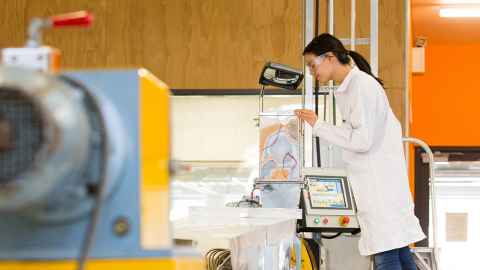Evolving NZ manufacturing to compete globally
1 March 2021
New Zealand’s manufacturing sector needs urgent change to survive post-Covid.

New Zealand’s manufacturing sector needs urgent change to survive post-Covid, including an end to reliance on ‘manual and archaic machinery’ which makes it difficult to compete internationally. This is the view of a manufacturing sector think tank based at the University of Auckland.
The think tank, the Laboratory for Industry 4.0 Smart Manufacturing Systems (LISMS), is a collaboration between researchers and industry, and is the country’s leading research institute on Industry 4.0 – the fourth industrial revolution.
“New Zealand manufacturers must embrace this latest industrial revolution,” says LISMS director Professor Xun Xu from the University’s Faculty of Engineering. “This is key to their future.”

LISMS has been collaborating with innovative companies since 2016, translating state-of-the-art manufacturing automation technologies into industry practice.
“We established the group in response to, and in recognition of, the needs from industry as well as the needs of our own students, the engineers of the future, in riding the global wave of Industry 4.0,” says Professor Xu.
Students work in a fully functioning Industry 4.0 technologies factory floor set-up to showcase technological solutions and allow industry to test and try out ideas.
Recent examples of LISMS’ work with industry include fully commercialised cloud-based production monitoring and control technologies and AI-driven big data analysis technologies for a leading manufacturing software supplier.
We established the group in response to, and in recognition of, the needs from industry as well as the needs of our own students, the engineers of the future, in riding the global wave of Industry 4.0
Another example is the implementation of the Digital Twin (DT) concept at a company that specialises in producing customised wooden boards[AS1] . Working with LISMS, the company developed a digital mirror of its bin and stacker process to solve bottleneck issues. The company has undertaken a factory-wide digital transformation to all its operations. LISMS has also helped manufacturers with research, consultation, and upskilling in areas including:
- Robotics and automation
- Industrial Internet of Things
- Artificial intelligence and data analytics
- Augmented and virtual realities
About Industry 4.0
Manufacturing conjures up images of hard-working people working long hours on large machinery and often rigid production lines. Industry 4.0 goes further, blending and integrating software, with the appropriate hardware to aid operators as well as automate mundane tasks.
Industry 4.0 manufacturing is more than fancy machines and robots. It defines the factories of the future where machines are interconnected and processes are optimised. As manufacturing tries to address the need for mass customisation, many New Zealand manufacturers need to become lean, agile, and smart in their operations. Industry 4.0 enables local manufacturers to speed up and expand production to a higher quality to win on the international market.
Watch the LISMS team's Tech Tuesday Talk.
Media contact
Aroha Mane | Media adviser
M: 021 2449707
E: aroha.mane@auckland.ac.nz